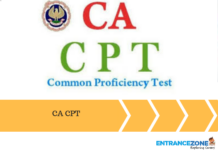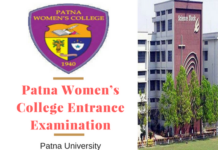Physical science is the study of chemistry and physics of nature and its life sciences in a way to include ecology and the evidence of historical facts. The department of Physical Sciences is dedicated to offering quality education while also preparing candidates for a life of service and faith. The candidates are advised to read the complete article given below to know more about Physical Science courses, eligibility and admission procedure.
Admission Open 2023
- Top University & Colleges Official Links, Application & Scholarship Forms.
Popular Physical Science Courses 2023
Contains
Physical science is the study of the fundamental laws of nature. It is divided into three main branches: physics, chemistry, and mathematics.
- Physics is the study of matter and energy. It deals with the laws of motion, gravity, electricity, and magnetism.
- Chemistry is the study of the composition, structure, and properties of matter. It deals with the interactions of atoms and molecules.
- Mathematics is the study of numbers, shapes, and patterns. It is used in all branches of physical science.
| Course | Duration | Eligibility | Career Prospects |
|---|---|---|---|
| Bachelor of Science (B.Sc.) in Physics | 3-4 years | 10+2 with Physics, Chemistry, and Mathematics as compulsory subjects | Scientists, Engineers, Teachers, Researchers |
| Master of Science (M.Sc.) in Physics | 2 years | B.Sc. in Physics degree | Scientists, Engineers, Teachers, Researchers |
| Doctor of Philosophy (Ph.D.) in Physics | 3-5 years | M.Sc. in Physics degree | Scientists, Engineers, Teachers, Researchers |
| Bachelor of Science (B.Sc.) in Chemistry | 3-4 years | 10+2 with Physics, Chemistry, and Mathematics as compulsory subjects | Chemists, Engineers, Teachers, Researchers |
| Master of Science (M.Sc.) in Chemistry | 2 years | B.Sc. in Chemistry degree | Chemists, Engineers, Teachers, Researchers |
| Doctor of Philosophy (Ph.D.) in Chemistry | 3-5 years | M.Sc. in Chemistry degree | Chemists, Engineers, Teachers, Researchers |
| Bachelor of Science (B.Sc.) in Mathematics | 3-4 years | 10+2 with Physics, Chemistry, and Mathematics as compulsory subjects | Mathematicians, Engineers, Teachers, Researchers |
| Master of Science (M.Sc.) in Mathematics | 2 years | B.Sc. in Mathematics degree | Mathematicians, Engineers, Teachers, Researchers |
| Doctor of Philosophy (Ph.D.) in Mathematics | 3-5 years | M.Sc. in Mathematics degree | Mathematicians, Engineers, Teachers, Researchers |
Benefits of Physical Science Course
Physical science courses are offered by many universities and colleges. They typically cover a wide range of topics, including:
Subscribe to Get Updated Information about Physical Science Courses Details 2023: Check Eligibility Criteria, Syllabus - Admissions
- Mechanics
- Electricity and magnetism
- Thermodynamics
- Optics
- Quantum mechanics
- Nuclear physics
- Statistical mechanics
- Mathematics
Physical science courses are challenging but rewarding. They provide students with a solid foundation in the fundamental laws of nature. This foundation can be used to pursue a career in a variety of fields, including:
- Science
- Engineering
- Mathematics
- Teaching
- Research
If you are interested in learning about the fundamental laws of nature, then a physical science course may be a good fit for you.
Here are some of the benefits of studying physical science:
- learn about the fundamental laws of nature.
- Develop critical thinking and problem-solving skills.
- Prepare for a variety of careers in science, engineering, and mathematics.
- You will be able to think creatively and come up with new solutions to problems.
- You will be able to communicate effectively, both verbally and in writing.
If you are interested in studying physical science, I encourage you to do some research on different universities and colleges that offer these courses. You should also talk to current students and graduates to get their insights on the program.
What are Eligibility Criteria for Physical Science Course?
The candidate must check the Physical Science course requirement for the admission given below:
| Courses | Eligibility |
| B.Sc | Candidates must have completed 10+2 with Physics, Chemistry and Mathematics as compulsory subjects. |
| BTech |
|
Skills required for Physical Science
Candidates who are interested in studying the properties of energy and non-living materials can go for this course.
- This course aims at providing a general understanding and foundation of the sciences for which any candidate must possess problem-solving ability and reasoning capabilities.
Physical Science Course Duration
The candidate can check the course time and duration from the below-given table:
| Course | Duration |
| BTech | 4 Years |
| B.Sc | 3 Years |
What is Syllabus for Physical Course?
UGC prepares a proper set of syllabus to be covered by universities during the course term. Given below are some of the important subjects prescribed:
Syllabus For B.Sc. in Physical Science
| Name of the Course | Topics Covered | Description |
| Calculus and Matrices |
|
The following course gives knowledge of various calculus and matrices concepts. |
| Analytical Chemistry |
|
Students with this course learn about the analytical prospects of Chemistry. |
| Solvent Extraction |
|
The course is about solvent extractions which are the part of chemistry itself. |
| Technical Writing and
Communication in English |
|
English is an important subject to be studied by students of every branch, so this course helps to learn the basics of the English language. |
| Thermodynamic and Statistical Physics |
|
The course imparts the knowledge of laws and other factors of thermodynamics. |
| Computer Fundamentals |
|
Here students learn about the fundamentals and working of the computer system. |
| Quantitative Methods Of Analysis |
|
This course is about analytical chemistry. |
Syllabus For B.Tech in Physical Science
| Semester I | Semester II | Semester III | Semester IV |
| Geometry and Calculus | Linear Algebra and Differential Equations | Complex Analysis and Integral Transforms | Numerical Methods, Partial Differential Equations and Calculus of Variation |
| Physics I | Physics II | Computer Networks And DBMS | Modern Optics or Analytical and Computational Chemistry |
| Chemistry I | Engineering Materials | Optics and Electromagnetic Waves | Classical Mechanics |
| Basic Mechanical Engineering | Basic Electronics and Computer Engineering | Organic Chemistry and Polymer Science | Earth System Science |
| Basic Electrical Engineering | Engineering Mechanics | Remote Sensing and Applications | Measurements and Instrumentation |
| Physics Lab I | Engineering Graphics | Introduction to Economics | Introduction to Social Science and Ethics |
| Chemistry Lab I | Basic Electronics and Electrical Engineering Lab | Physics Lab II or Chemistry Lab II | Optics Lab or Computational Chemistry Lab |
| Basic Engineering Lab | Basic Programming Lab | Remote Sensing Lab | Earth System Science Lab |
| Communication Skills Lab | — | —- | Measurement and Instrumentation Lab |
| Semester V | Semester VI | Semester VII | Semester VIII |
| Probability and Statistics | Statistical Mechanics | Principles of Management System | Stream Comprehensive Vice-Voce |
| Quantum Mechanics | Atomic, Molecular and Nuclear Physics | Stream Elective IV | Project Work |
| Atmospheric and Ocean Science | Pattern Recognition | Stream Elective V | — |
| Introduction to Astronomy and Astrophysics | Stream Elective I | Department Elective | — |
| Environmental Science and Engineering | Stream Elective II | Institute Elective | — |
| Computational Physics Lab | Stream Elective III | Elective Lab | — |
| Digital Signal Processing or Basic of Chemical Engineering | Modern Physics Lab | Seminar | — |
| Digital Signal Processing Lab or Chemical Engineering Lab | — | — | — |
What is Admission Process for Physical Science Course?
In B.sc physical admissions are done through both merit and entrance test. The different cutoff is prepared by the colleges.
For B.Tech
- Institute generally take their entrance test for admission to the course.
- Candidates have to qualify JEE to get admission in this course.
- JEE Mains offers two papers and candidates are required to take anyone paper for admission, or both as required in their discipline.
- The maximum number of valid attempts that a candidate can avail for JEE Mains is 3, while for JEE Advanced, it is 2.
Job Profiles After Physical Science Course
Candidates who will successfully graduate in B. Tech with Physical Sciences can find a range of rewarding career opportunities such as the ones listed below with the corresponding job descriptions and salaries offered:
After B.Tech:
| Designation | Description |
| Academic Editor- Physical Science | Responsible for focusing on specific subjects of expertise such as Health, technology and medicine. |
| Research Scientists | Responsible for carrying and planning out experiments in different fields like geosciences, medical research, meteorology and pharmacology and planning. |
| Process Safety Engineer | Responsible for developing practices for process safety strategies and supporting the project team for purpose and cost. |
| Assistant Professor | Responsible for teaching lab sessions as adhering to lab safety, assigned and hazardous waste disposal. |
Job after successful completion of B.Sc in Physical Science:
| Job Profile | Description |
| Research Scientist | A research scientist is supposed to make research on ceramic materials. |
| Clinical Research Scientist | One is responsible for analysing, formulating and interpreting various clinical development plans. |
| Chemical Research Scientist | The concerned person has to conduct various research to develop new chemical products. |
| Pharmacist | A pharmacist has to develop automated data and analytics to support pharmacy services. |
| Quality Control Manager | The person is responsible for handling lab and quality assurance of products. |
Physical Science Course Application form
The candidates must read all the points given below to apply for the course of Physical Science:
- The applicants can apply through online mode.
- Candidates must check their eligibility before applying for this course.
- Candidates must fill the application form correctly and carefully otherwise authority will reject the registration form.
- Candidate must have qualified the JEE Main with valid scores to apply for the course in B.Tech.
- Only those candidates will be called for the interview and counselling who have completed the application process.
Colleges/Universities Offering Physical Science
The candidates can check the list of universities and colleges who offer Physical science course in India:
- Indian Institute of Technology, New Delhi.
- Indian Institute of Technology, Madras.
- Indian Institute of Technology, Guwahati.
- Indian Institute of Space Science and Technology, Thiruvananthapuram.
- Indian Institute of Technology, Bombay.
- National Institute of Technology, Calicut.
- Technology Education & Research Integrated Institutions Kurukshetra.
- Guru Gobind Singh Indraprastha University, New Delhi.
Physical Science Course Highlights
Candidate can check the overview of the physical course from the below-given table:
| Branch Name | Physical Science |
| Popular Courses | B.Tech/M.tech and B.Sc/M.Sc |
| Duration of course | B.Tech- 4 years
B.sc- 2 years |
| Selection Criteria | Based on the merit in JEE main and other institute exams |
About Physical Science
The interdisciplinary field of physical science combines studies in math, chemistry, medicine, environmental science and geology. Through these courses, candidates can explore the world around them to understand the non-living systems. Physical science courses are available in undergraduate degree programs in chemistry, physics and the earth sciences, which include geology, oceanography and meteorology.
See Popular Courses After 12th Here.



















